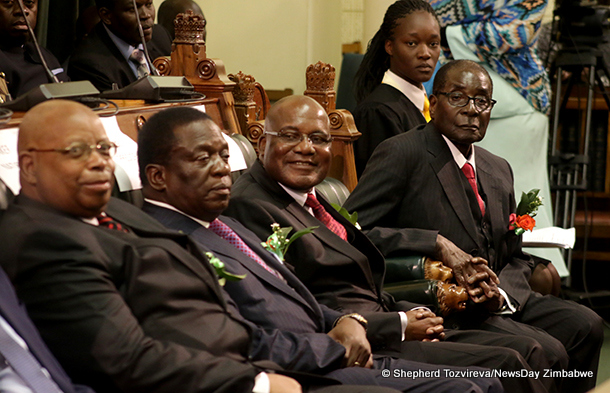
Concern has been raised on the continued failure by ministers to attend parliamentary sessions and respond to motions and questions raised by Members of Parliament and committees.
While the situation has improved from previous sessions, there are still some truant ministers that continue to give the Speaker of the National Assembly and the President of the Senate headaches. So what can be done to decisively deal with this problem?
From the beginning, let me say that the bunking of parliamentary sessions by ministers is a serious breach of the Constitution. Section 107 (2) requires every vice-president, minister and deputy minister to attend Parliament and parliamentary committees in order to answer questions concerning matters for which he/she is collectively or individually responsible. It is not optional, but an obligation.
Let me also clarify that it is not only one vice-president who is required to attend parliamentary sessions, but the two vice-presidents. The Constitution says “every” vice-president and not one of the vice-presidents. Furthermore, the vice-presidents are expected to attend parliamentary committee meetings when invited, and not plenary sessions only. My interpretation of this constitutional provision is that it is within the right of committees to summon the two vice-presidents to appear before them if they feel the issues on the agenda can only be adequately addressed at that level.
Even the President is expected to address Parliament at least once a year. Although it is not obligatory for the President to answer questions on any issue as may be provided in the standing orders or the rules of procedure, section 140 says he/she must address a joint sitting of both houses at least once a year.
The Constitution, however, does not spell out the actions to be taken when vice-presidents, ministers and deputy ministers fail to abide by the constitutional obligation to attend parliamentary sessions.
The measures to be taken are found in the standing orders. Section 139 of the Constitution empowers Parliament to make its own regulations to guide its proceedings. I must say that the revised standing orders have adequate provisions to punish ministers and vice-presidents who abscond from their parliamentary commitments.
The rules require every minister or deputy minister to respond to a committee report within 10 sitting days. Failure to do so constitutes contempt of Parliament after having been notified of the report. A minister or deputy minister who is unable to attend the sittings of Parliament under section 107 (2) of the Constitution is required to make an application for leave of absence in writing to the Speaker. A minister or deputy minister who fails to attend Parliament without leave having been granted shall be in contempt of Parliament.
- Chamisa under fire over US$120K donation
- Mavhunga puts DeMbare into Chibuku quarterfinals
- Pension funds bet on Cabora Bassa oilfields
- Councils defy govt fire tender directive
Keep Reading
Section 148 of the Constitution says an Act of Parliament may provide for other privileges, immunities and powers of Parliament and its members and officers, and defines conduct which constitutes contempt of Parliament, whether committed by Members of Parliament or other people. The Act also provides for a right of reply, through the Speaker or the President of the Senate, as the case may be, for persons who are unjustly injured by what is said about them in Parliament. The same provision goes on to state that no such Act may permit Parliament or its members or officers to impose any punishment in the nature of a criminal penalty, other than a fine, for breach of privilege or contempt of Parliament.

The Act governing contempt of Parliament is the Privileges, Immunities and Powers of Parliament Act. The General Laws Amendment Bill, currently before Parliament, has provisions to amend the Act. The Bill gives Parliament, when sitting as a court, power to impose not only fines for contempt of Parliament, but also imprisonment for up to two years in default of payment of the fines. What this means is that if a person who has been convicted of contempt fails to pay the fine imposed by Parliament, he or she will have to serve the period of imprisonment which Parliament has specified as a default punishment.
Contempt of Parliament attracts a fine not exceeding level seven. Section 280 and the First Schedule of the Criminal Law (Codification and Reform) Act (Chapter 9:23) as amended by the Finance Act, 2009 (No. 3 of 2009) provides that a level seven fine is $400.
There are some people who feel that the fine is too low, and not deterrent enough. On the contrary, it is not the level of the fine that matters the most, but the negative publicity accompanying someone charged under contempt of Parliament. The negative publicity is serious punishment on its own.
So it is high time the legislative branch invoked contempt of Parliament provisions if we are to resolve, once and for all, the perennial problem of ministers not taking Parliament business seriously. Charging one minister with contempt of Parliament will see the others scrambling to attend parliamentary sessions and committee business.
Section 106 (3) of the Constitution provides for an Act of Parliament to prescribe a code of conduct for vice-presidents, ministers and deputy ministers. Parliament should enact this law and include in the code a requirement for ministers to attend parliamentary sessions.
The Constitution and the standing orders have adequate provisions empowering Parliament to enforce better accountability by the executive branch. Lack of enforcement is not synonymous with lack of powers.
l John Makamure is the executive director of the Southern African Parliamentary Support Trust. Feedback: [email protected]











